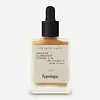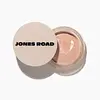What's inside
What's inside
 Key Ingredients
Key Ingredients

 Benefits
Benefits

 Concerns
Concerns

 Ingredients Side-by-side
Ingredients Side-by-side

Water
Skin ConditioningIsoamyl Laurate
EmollientC9-12 Alkane
SolventSqualane
EmollientPolyglyceryl-3 Diisostearate
EmulsifyingPropanediol
SolventSilica
AbrasivePolyglyceryl-6 Polyricinoleate
EmulsifyingGlycerin
HumectantMagnesium Sulfate
Ascorbyl Tetraisopalmitate
AntioxidantPolyglyceryl-2 Isostearate
EmulsifyingCoco-Caprylate/Caprate
EmollientDisteardimonium Hectorite
StabilisingHydroxyethylcellulose
Emulsion StabilisingSodium Benzoate
MaskingDisodium Stearoyl Glutamate
CleansingPotassium Sorbate
PreservativeAloe Barbadensis Leaf Juice
Skin ConditioningAluminum Hydroxide
EmollientSodium Nitrate
SoothingCI 77891
Cosmetic ColorantCI 77492
Cosmetic ColorantCI 77491
Cosmetic ColorantCI 77499
Cosmetic ColorantWater, Isoamyl Laurate, C9-12 Alkane, Squalane, Polyglyceryl-3 Diisostearate, Propanediol, Silica, Polyglyceryl-6 Polyricinoleate, Glycerin, Magnesium Sulfate, Ascorbyl Tetraisopalmitate, Polyglyceryl-2 Isostearate, Coco-Caprylate/Caprate, Disteardimonium Hectorite, Hydroxyethylcellulose, Sodium Benzoate, Disodium Stearoyl Glutamate, Potassium Sorbate, Aloe Barbadensis Leaf Juice, Aluminum Hydroxide, Sodium Nitrate, CI 77891, CI 77492, CI 77491, CI 77499
Water
Skin ConditioningCaprylic/Capric Triglyceride
MaskingC12-15 Alkyl Benzoate
AntimicrobialCaprylic/Capric/Succinic Triglyceride
EmollientPropanediol
SolventSimmondsia Chinensis Seed Oil
EmollientOlea Europaea Fruit Oil
MaskingCoco-Caprylate/Caprate
EmollientDiisostearyl Malate
EmollientC9-12 Alkane
SolventPolyhydroxystearic Acid
EmulsifyingHydrogenated Castor Oil
EmollientRicinus Communis Seed Oil
MaskingHelianthus Annuus Seed Wax
Skin ConditioningStearalkonium Hectorite
Gel FormingEuphorbia Cerifera Wax
Polyglyceryl-3 Diisostearate
EmulsifyingPolyglyceryl-3 Polyricinoleate
EmulsifyingPhenoxyethanol
PreservativeCopernicia Cerifera Wax
Silica Silylate
EmollientSodium Chloride
MaskingPelargonium Graveolens Oil
MaskingTocopheryl Acetate
AntioxidantPolyglyceryl-6 Polyricinoleate
EmulsifyingTriethoxycaprylylsilane
Zingiber Officinale Root Oil
MaskingLecithin
EmollientSilica
AbrasiveBiosaccharide Gum-1
HumectantSodium Hyaluronate
HumectantMica
Cosmetic ColorantCI 77891
Cosmetic ColorantIron Oxides
Citronellol
PerfumingGeraniol
PerfumingLinalool
PerfumingLimonene
PerfumingCitral
PerfumingWater, Caprylic/Capric Triglyceride, C12-15 Alkyl Benzoate, Caprylic/Capric/Succinic Triglyceride, Propanediol, Simmondsia Chinensis Seed Oil, Olea Europaea Fruit Oil, Coco-Caprylate/Caprate, Diisostearyl Malate, C9-12 Alkane, Polyhydroxystearic Acid, Hydrogenated Castor Oil, Ricinus Communis Seed Oil, Helianthus Annuus Seed Wax, Stearalkonium Hectorite, Euphorbia Cerifera Wax, Polyglyceryl-3 Diisostearate, Polyglyceryl-3 Polyricinoleate, Phenoxyethanol, Copernicia Cerifera Wax, Silica Silylate, Sodium Chloride, Pelargonium Graveolens Oil, Tocopheryl Acetate, Polyglyceryl-6 Polyricinoleate, Triethoxycaprylylsilane, Zingiber Officinale Root Oil, Lecithin, Silica, Biosaccharide Gum-1, Sodium Hyaluronate, Mica, CI 77891, Iron Oxides, Citronellol, Geraniol, Linalool, Limonene, Citral
 Reviews
Reviews

Ingredients Explained
These ingredients are found in both products.
Ingredients higher up in an ingredient list are typically present in a larger amount.
C9-12 Alkane is synethically created using alkanes, or paraffins. It is added to products as a solvent. This means its main purpose is to help dissolve ingredients and create even texture.
Ci 77891 is a white pigment from Titanium dioxide. It is naturally found in minerals such as rutile and ilmenite.
It's main function is to add a white color to cosmetics. It can also be mixed with other colors to create different shades.
Ci 77891 is commonly found in sunscreens due to its ability to block UV rays.
Learn more about CI 77891Coco-Caprylate/Caprate is created from fatty coconut alcohol, caprylic acid, and capric acid.
It is a lightweight emollient. Emollients create a thin barrier on the skin to trap moisture in. This helps keep your skin hydrated and soft.
Once applied, Coco-Caprylate/Caprate is absorbed quickly and leaves a silky feel.
Coco-Caprylate/Caprate may not be fungal acne safe.
Learn more about Coco-Caprylate/CapratePolyglyceryl-3 Diisostearate is an emulsifer and emollient. It comes from Isostearic Acid and Polyglycerin-3.
As an emulsifier, it helps stabilize products by preventing oils and water from separating.
This ingredient may not be Malassezia folliculitis, or fungal acne safe.
Learn more about Polyglyceryl-3 DiisostearatePolyglyceryl-6 Polyricinoleate isn't fungal acne safe.
Propanediol is an all-star ingredient. It softens, hydrates, and smooths the skin.
It’s often used to:
Propanediol is not likely to cause sensitivity and considered safe to use. It is derived from corn or petroleum with a clear color and no scent.
Learn more about PropanediolSilica, also known as silicon dioxide, is a naturally occurring mineral. It is used as a fine, spherical, and porous powder in cosmetics.
Though it has exfoliant properties, the function of silica varies depending on the product.
The unique structure of silica enhances the spreadability and adds smoothness, making it a great texture enhancer.
It is also used as an active carrier, emulsifier, and mattifier due to its ability to absorb excess oil.
In some products, tiny microneedles called spicules are made from silica or hydrolyzed sponge. When you rub them in, they lightly polish away dead skin layers and enhance the penetration of active ingredients.
Learn more about SilicaWater. It's the most common cosmetic ingredient of all. You'll usually see it at the top of ingredient lists, meaning that it makes up the largest part of the product.
So why is it so popular? Water most often acts as a solvent - this means that it helps dissolve other ingredients into the formulation.
You'll also recognize water as that liquid we all need to stay alive. If you see this, drink a glass of water. Stay hydrated!
Learn more about Water